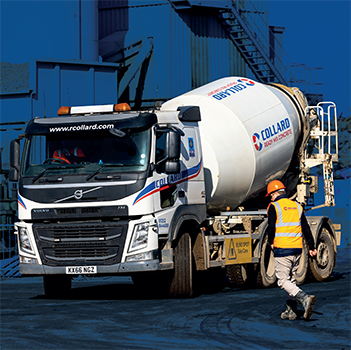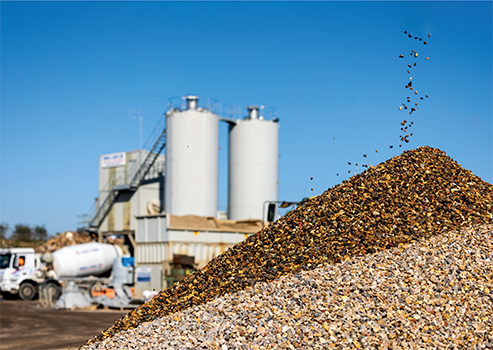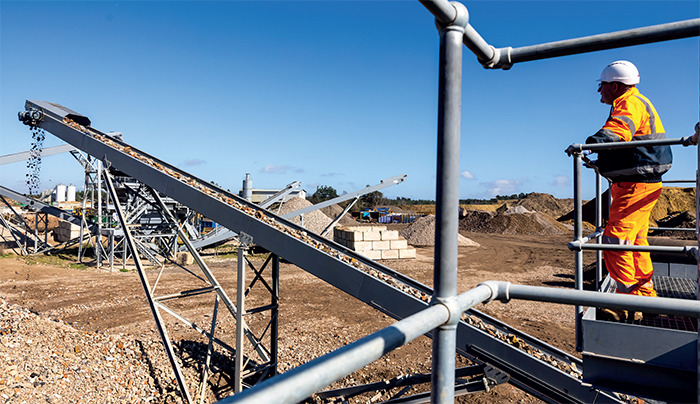How Collard Group is changing the construction game
Breaking down, building up
When Construction & Civil Engineering last spoke with Collard Group (Collard) in 2019, the world was a very different place. Masks still reminded us of Halloween and Zorro. Corona was gleefully ordered with a wedge of lime. People still blew out candles on birthday cakes without thinking about spreading germs. Ironically, last time we sat down with Managing Director, Robert Collard, he thought 2020 was going to be an interesting year. That is certainly one word for it.
 “The pandemic was a very difficult time, both commercially and personally, not just for us as a company but for our customers and staff as well,” he now reflects, several years on. “However, it is this difficulty that enabled us to pause and re-evaluate the core values of Collard Group, along with our systems and procedures. Indeed, having to practically adapt to the ever-changing needs of our staff and customers during the furlough period meant that we also had to streamline our operations and become more efficient without compromising on safety or quality.
“The pandemic was a very difficult time, both commercially and personally, not just for us as a company but for our customers and staff as well,” he now reflects, several years on. “However, it is this difficulty that enabled us to pause and re-evaluate the core values of Collard Group, along with our systems and procedures. Indeed, having to practically adapt to the ever-changing needs of our staff and customers during the furlough period meant that we also had to streamline our operations and become more efficient without compromising on safety or quality.
“Covid-19 has been a major event for everyone, and it has changed the outlook of many,” he continues. “However, considering the difficulties of the last three years, particularly with the pandemic and Brexit, morale has remained high. During the furlough period, for instance, people enjoyed the benefits of working from home, and this fundamentally changed how many businesses operate.”
Despite these testing obstacles, the company, which has the capacity to process and recycle one million tonnes of construction waste per year, has experienced significant growth since our last feature. Following the acquisition of Raymond Brown Waste Solutions in late 2019, it has not only rebranded, but also restructured and expanded its geographical reach across Surrey, Hampshire, Berkshire, Wiltshire, and Oxfordshire.
Refusing stasis and fixity, the company has catapulted itself forward – and the intention is to keep the wheels turning. “As a business, we are never prepared to stand still or by the sidelines,” elaborates Robert. “Instead, we will continually invest in the latest equipment, even in difficult financial times.
Circular service
“But, at the end of the day, it is our people who are at the heart of our business and its success,” he admits. “We have a strong philosophy of promoting from within, and we invest in a range of training and apprenticeships programmes to give people the opportunities and confidence they need to have a long career with us.”
In fact, four of Collard’s team have just celebrated the major milestone of 20 years of employment at the company. It is that commitment, passion, and strong can-do attitude that Robert sees as the evidence to keep reinvesting back into the business and expanding through new acquisitions. “The people at Collard encourage me to take advantage of exciting new opportunities as they arise through a resounding sense of positivity and loyalty,” he notes. “Indeed, by investing over £5 million every year in research and development, plant facilities, and equipment, we have been able to attract the very best strategic and operational team. Alongside that, we have developed a robust network of suppliers, who are undoubtedly part of our continued success.”
 Thanks to these relationships, Collard has established itself as one of the largest privately-owned national demolition contractors and waste management firms in the South of England, employing 400 people, operating 150 trucks with more than 4000 skips, and turning over more than £60 million. As Robert goes on to point out, another reason behind this continued success is the new, complete circular service that Collard is offering to its customers.
Thanks to these relationships, Collard has established itself as one of the largest privately-owned national demolition contractors and waste management firms in the South of England, employing 400 people, operating 150 trucks with more than 4000 skips, and turning over more than £60 million. As Robert goes on to point out, another reason behind this continued success is the new, complete circular service that Collard is offering to its customers.
“Since 1994, our family-run business has grown, adapted, and evolved to reflect the many changes in the construction and waste sectors, providing expert closed-loop solutions for a significant number of complex projects across the UK,” he explains. “Our unique capability to repurpose virtually all construction and demolition waste from site helps our public sector, local authority, commercial, and residential clients achieve their zero-to-landfill targets.”
By demolishing, recycling, and repurposing material, Collard can take what was destined for the rubbish pile and help turn it into a new building, ensuring landfill and virgin material cost savings for clients. More importantly, though, Collard is slashing the carbon footprint of other firms one piece of rubble at a time.
“We also now produce a range of BSEN206 8500 ready mix concrete using construction and demolition waste,” Robert details. “That is something we believe we are the first in the UK to do, and we have received industry-wide acclaim as a result.
“In addition to that, our 90-meters-cubed-per-hour concrete plant represents one of our most significant investments to date,” he adds. “Our concrete is checked by our UKAS-accredited, onsite laboratory to make sure it meets BSI standards. We now have nine licenced waste transfer stations across the South East and are continuing to upgrade them in order to maximise their efficiency and capacity.
“Meanwhile, at our materials recycling facility in Reading, we are making excellent progress on building a huge extension, doubling our waste processing capacity at the site,” Robert reveals. “The infrastructure works are almost complete ahead of the highly anticipated installation of our new £2.5 million Terex waste plant in the coming months. These upgrades help us to process more waste, protect the planet, and achieve our industry-leading recycling statistics.”
As our interview has made clear, though Collard is in the business of breaking things down, it is also determined to build them back up. For instance, in 2020 the company won two major awards at the National Recycling Awards, an event organised and hosted by Materials Recycling Weekly. The judging panel crowned Collard as Independent Operator of the Year and as running the Recycling Facility of the Year.
Going forward, Robert admits the future of the company looks bright. “The rest of the year looks very positive,” he says. “We have had a strong year thus far and our pipeline of projects is healthy.
“In the next five years or so, I would like to see the business continue to grow and develop into one of the South of England’s largest independent demolition, waste, and recycling companies, while at the same time also allowing the continued development of the management team and the careers of our people,” he concludes.
www.rcollard.com
